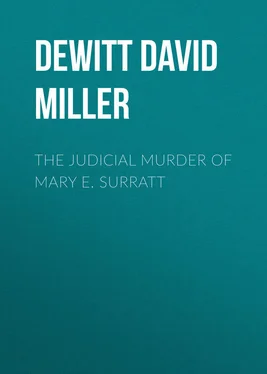David DeWitt - The Judicial Murder of Mary E. Surratt
Здесь есть возможность читать онлайн «David DeWitt - The Judicial Murder of Mary E. Surratt» — ознакомительный отрывок электронной книги совершенно бесплатно, а после прочтения отрывка купить полную версию. В некоторых случаях можно слушать аудио, скачать через торрент в формате fb2 и присутствует краткое содержание. Жанр: foreign_antique, foreign_prose, на английском языке. Описание произведения, (предисловие) а так же отзывы посетителей доступны на портале библиотеки ЛибКат.
- Название:The Judicial Murder of Mary E. Surratt
- Автор:
- Жанр:
- Год:неизвестен
- ISBN:нет данных
- Рейтинг книги:5 / 5. Голосов: 1
-
Избранное:Добавить в избранное
- Отзывы:
-
Ваша оценка:
- 100
- 1
- 2
- 3
- 4
- 5
The Judicial Murder of Mary E. Surratt: краткое содержание, описание и аннотация
Предлагаем к чтению аннотацию, описание, краткое содержание или предисловие (зависит от того, что написал сам автор книги «The Judicial Murder of Mary E. Surratt»). Если вы не нашли необходимую информацию о книге — напишите в комментариях, мы постараемся отыскать её.
The Judicial Murder of Mary E. Surratt — читать онлайн ознакомительный отрывок
Ниже представлен текст книги, разбитый по страницам. Система сохранения места последней прочитанной страницы, позволяет с удобством читать онлайн бесплатно книгу «The Judicial Murder of Mary E. Surratt», без необходимости каждый раз заново искать на чём Вы остановились. Поставьте закладку, и сможете в любой момент перейти на страницу, на которой закончили чтение.
Интервал:
Закладка:
“The suggestion was acquiesced in, nem. con.
“Mr. Johnson. – I appear, then, as counsel for Mrs. Surratt.”
In reviewing, at this distance of time, the foregoing scene, it is scarcely possible to realize the state of mind of a member of a tribunal claiming at least to be a court of justice, that could prompt such an onslaught – so shocking to the universal expectation of dignity and decorum, not to say absolute impartiality, in a judge.
The interpretation put upon the letter of Reverdy Johnson to his constituents by Generals Harris and Hunter was the ordinary, ill-considered, second-hand version circulated by blind party hostility. This is clearly shown by the fact that the objection of General Harris was not founded upon a recent perusal of the letter, but upon his own recollection of the impression it made in his own party circles the year before.
When, on the next Wednesday, General Harris, having in the meantime looked it up, presented a copy of the incriminated opinion, prefacing a request that it be made a part of the record by the sneering remark that “the Honorable gentleman ought to be very thankful to me for having made an occasion for him to disclaim before the country any obliquity of intention in writing that letter;” and, on the suggestion of General Hunter, the letter was read; every fair minded man ought to have been convinced that it was open to such a malign misconstruction only by an unscrupulous political enemy.
But suppose for a moment that their own hasty and uncharitable construction was correct, what right – what color of justification – did that give these two military Judges to make that letter of the year before the pretext for a sudden attack in open court upon such a man as Reverdy Johnson, and on the consecrated occasion of his appearing as counsel for a lady on trial for her life?
As to General Harris’ argument that the requirement of an oath gave the Commission a right to inquire whether the written opinions of a counsel chosen for a defendant, previously delivered as a party leader, were of such a character as to render him incompetent to take an oath which the Supreme Court of the United States and the Senate of the United States had recognized his competency to take; why, it is charitable to suppose – and his subsequent claim would have been scouted as preposterous in any law-court in the world.
With regard to General Hunter, his ferocious personal defiance, hurled from the very Bench, demonstrated in a flash his preëminent unfitness for any function that is judicial even in a military sense. It is manifest that this whole attack, whether concerted or not, was not made from any conscientious regard for the sanctity of an oath, nor from any sensitive fear that Reverdy Johnson, as an oath-breaker, might contaminate the tribunal; but it was either a mere empty ebullition of party spleen, or of party hatred towards a distinguished democrat, or it was made with a deliberate design to rob a poor woman of any probable advantage such eminent counsel might procure for her.
And whether the latter terrible suspicion be well founded or not, true it is that this cruel result, notwithstanding the withdrawal of the objection, did not fail of full accomplishment.
Reverdy Johnson, though suffered to appear as counsel, was virtually out of the case. He was present only at rare intervals during the trial, and sent in his final argument to be read by one of his juniors. The Court had put its brand upon him, and to any subsequent effort of his it turned an indifferent countenance and a deaf ear. He, forsooth, had “sympathized” with the Rebellion and that was enough! His appearance worked only harm to his client, if harm could be done to one whom the Court believed to have been also a sympathizer with rebellion, and who was already doomed to suffer in the place of her uncaptured son.
Another incident, occurring after the testimony on behalf of the prisoners had begun, will illustrate still more clearly, if possible, the mental attitude of the Court.
Among the witnesses sworn on the first day of the trial in secret session was one Von Steinacker, who, according to his own statement, had been in the Confederate Army, on the staff of Major-General Edward Johnson. He told the usual cock-and-bull story about seeing Booth in Virginia, in 1863, consorting with the rebel officers and concocting the assassination of Lincoln. At the time of his examination he was a prisoner of war, but after he had given his testimony he was discharged. The counsel for the defense knowing nothing of the witness did not cross-examine him at all. But, subsequently, they discovered that, after having once been convicted of an attempt to desert, he had at last succeeded in deserting the Union Army, and had entered the service of the Confederates; that he had been convicted of theft by a court-martial; and that his whole story was a fiction. Thereupon, as soon as possible, the counsel for Mrs. Surratt applied for the recall of the witness for cross-examination, so as to lay the basis for his contradiction and impeachment; and they embodied the facts they were ready to prove in a paper which was signed by Reverdy Johnson and the other counsel for Mrs. Surratt. This application seems to have strangely disturbed the Judge-Advocates and aroused the ire of the Court. The prosecuting officers professed to have no knowledge of the whereabouts of the witness; and General Wallace, moved from his wonted propriety, delivered himself as follows:
“I, for my part, object to the appearance of any such paper on the record, and wish to say now that I understand distinctly and hold in supreme contempt, such practices as this. It is very discreditable to the parties concerned, to the attorneys, and, if permitted, in my judgment will be discreditable to the Court.”
Mr. Clampitt, with the most obsequious deference to the Court, deprecated any such reflection upon the conduct of counsel and alluded to their duty to their unfortunate clients. But this humble apology was declared not satisfactory to the General or to the Court; and the application was not only refused but the paper was not allowed to go upon the record. However, this summary method of keeping facts out of sight availed nothing. Mrs. Surratt’s counsel had caused to be summoned as a witness, to contradict and impeach Von Steinacker, Edward Johnson, the very Major-General on whose staff the witness had sworn he had been.
General Johnson, a distinguished officer in the Confederate Army, was taken prisoner in 1864 and had been in confinement since, as such, at Fort Warren. From thence he had been brought to attend before the Commission in obedience to a subpœna issued by the Court.
On the 30th of May, he was called as a witness and appeared upon the stand to be sworn. As he stood there, in his faded uniform, bearing, doubtless, traces of the six months’ imprisonment from which he had come at the command of the Court, facing the officers of the Army he had so often encountered, and with his back turned upon the woman on whose behalf he had been summoned; General Albion P. Howe deemed it his duty as an impartial judge to make the following attack upon him.
After stating that it was well known that “the person” before the Court had been educated at the National Military Academy, and had since for many years held a commission in the U. S. Army, and had therefore taken the oath of allegiance, this gallant officer and upright judge proceeded:
“In 1861, it became my duty as an officer to fire upon a rebel party, of which this man was a member, and that party fired upon, struck down, and killed loyal men that were in the service of the Government. I understand that he is brought here now as a witness to testify before this Court, and he comes here as a witness with his hands red with the blood of his loyal countrymen, shed by him or by his assistants, in violation of his solemn oath as a man and his faith as an officer. I submit to this Court that he stands in the eye of the law as an incompetent witness, because he is notoriously infamous. To offer as a witness a man who stands with this character, who has openly violated the obligations of his oath, and his faith as an officer, and to administer the oath to him and present his testimony, is but an insult to the Court and an outrage upon the administration of justice. I move that this man, Edward Johnson, be ejected from the Court as an incompetent witness on account of his notorious infamy on the grounds I have stated.”
Читать дальшеИнтервал:
Закладка:
Похожие книги на «The Judicial Murder of Mary E. Surratt»
Представляем Вашему вниманию похожие книги на «The Judicial Murder of Mary E. Surratt» списком для выбора. Мы отобрали схожую по названию и смыслу литературу в надежде предоставить читателям больше вариантов отыскать новые, интересные, ещё непрочитанные произведения.
Обсуждение, отзывы о книге «The Judicial Murder of Mary E. Surratt» и просто собственные мнения читателей. Оставьте ваши комментарии, напишите, что Вы думаете о произведении, его смысле или главных героях. Укажите что конкретно понравилось, а что нет, и почему Вы так считаете.












